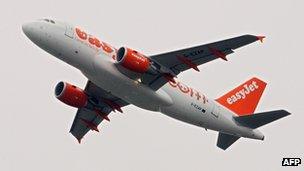Easyjet loses disability discrimination case in France
- Published

A French court has found the British low-cost airline Easyjet guilty of discriminating against three disabled passengers in 2008 and 2009.
The court fined Easyjet 70,000 euros ($90,000, £58,000) for not allowing the unaccompanied wheelchair users onto a plane at Charles de Gaulle airport near Paris, citing safety concerns.
A lawyer for the three passengers described it as a "landmark ruling".
Easyjet has denied any "discriminatory intention" and says it may appeal.
During the trial prosecutor Abdelkrim Grini said Easyjet's business model was behind the discrimination.
He accused the company of having "an aggressive commercial policy that consists of reducing operating costs as much as possible".
All three of the passengers who brought the case were told they could not check in for their flights because they did not have a helper to assist with their evacuation in the event of an emergency.
One of the three, Karine Viera, had ticked a box when booking on the Easyjet website to say she was in a wheelchair, the French disability rights group APF says.
The group says she was denied a refund when she went to the company's main desk at the airport.
The court ordered Easyjet to pay each of the passengers 2,000 euros ($2,500, £1,660) in compensation.
A lawyer for the three, Patrick de la Grange, said: "This is an economic model that's being punished, that of low-cost. With cost reductions, the aim is to have as few personnel as possible."
Easyjet said it carried 1,000 reduced-mobility passengers every day and was disappointed by the outcome of the case.
"The company denies having had any discriminatory intention whatsoever," company lawyer, Philippe Van der Meulen said, adding that Easyjet would consider appealing against the verdict.
The company will face further similar charges at another court case in Paris in March.
- Published13 January 2012
- Published13 August 2010